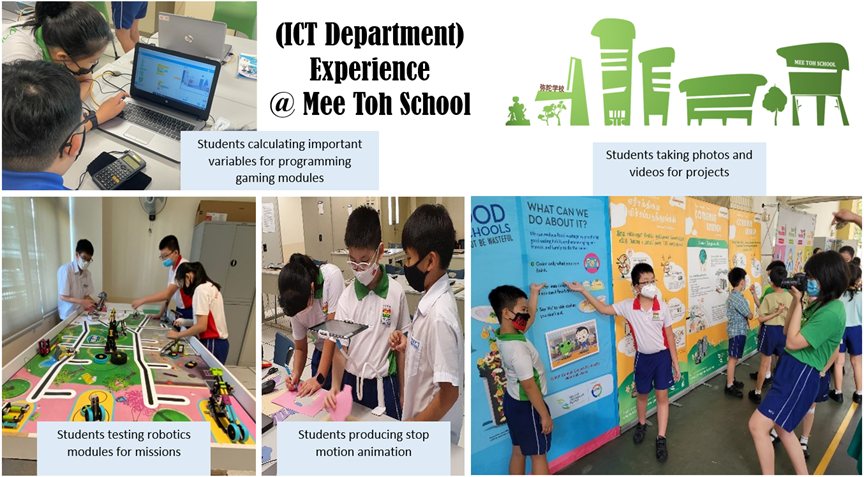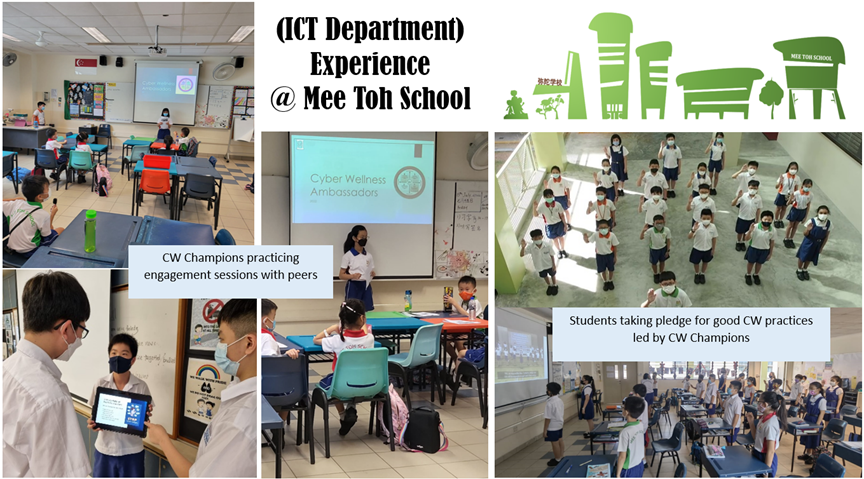ICT in Education
|
Vision |
A community of self-directed learners who collaborate through the responsible use of ICT to better self and others. |
|
Mission |
Create enriched networked learning opportunities anchored by the responsible use of ICT. |
|
Focus Area |
Goals |
|
Curriculum and Instruction
|
Enrich and curate self-directed and collaborative learning activities facilitated by the responsible use of ICT |
|
Staff Development
|
Enable staff capacity in harnessing and curating ICT resources to engage, enhance and enrich instruction and learning. |
|
Learning and Infrastructure
|
Create a conducive and enriched learning environment for staff and students to leverage ICT in teaching and learning. |
HIGHLIGHTS
Digital Literacy Programme
Our curriculum has been refreshed and embedded with digital literacy skillsets which form essential ICT skills for our students to thrive as 21st century learners in a digital environment. It also includes heightening our students’ awareness of Cyber Wellness to be responsible digital learners.
The Digital Literacy Programme guides our students to be more proficient and confident users of the various software and devices as they progress through the levels over the years. As students build up their competence with these ICT skillsets, they will be able to apply, demonstrate their learning and create their learning artefacts in different creative ways.
Level Programmes:
|
Level |
Programme |
|---|---|
|
Primary 1 |
SLS, Online Noticeboard and Touch Typing |
|
Primary 2 |
SLS, Online Noticeboard and Touch Typing |
|
Primary 3 |
SLS, Online Noticeboard
|
|
Primary 4 |
SLS, Online Noticeboard
|
|
Primary 5 |
SLS, Online Noticeboard
|
|
Primary 6 |
SLS, Online Noticeboard
|

Cyber Wellness (CW)
Our CW education focuses on building our students as responsible digital learners. There are 3 main principles that guide our students’ decision-making and anchor their well-being:
· Respect for self and others.
· Safe and responsible use.
· Positive peer influence.
Through our CW lessons integrated within our curriculum, our students get to:
· Sense – Identify possible online
risks and protect themselves.
· Think – Analyse, evaluate and reflect
on a situation based on the CW principles
· Act – Take actions to keep safe and
be a positive influence online.
The CW lessons cover the issues associated with ethical, legal, safe and responsible use of ICT in alignment with Character & Citizenship Education (CCE) in MTS. Students get to discuss and reflect on these issues related to being a safe, responsible and respectful user of technology.
|
Coverage |
Activities |
|---|---|
|
School Wide CW Programme |
· Assembly talks
|
|
FTGP |
· Primary 1 to 6 CW-FTGP Activities |
|
Subject Integrated Activities |
· All subjects
|

Home-Based Learning (HBL)
Students participate in yearly Home-Based Learning and e-Learning exercises to develop self-directedness in online learning. This is part of the school Curriculum Continuity Plan which prepares our learners to be ready to continue their learning during prolonged school closure.
Students put into practice the ICT skills they have learnt in school during HBL. Teachers designed lessons on online platforms such as Student Learning Space (SLS) and other online learning platforms. As self-directed learners at home, students completed the assignments virtually. Through the online submissions of assignments, teachers were able to monitor students’ learning. Back in school, teachers continue to provide students with feedback on their performances and support them in reinforcing their learning.
|
Schedule for HBL |
Time |
|---|---|
|
Log-in Readiness Exercise |
February |
|
Home-Based Learning |
Ongoing |
|
e-Learning Exercise |
PSLE Written Exam Week |
Updated on 13 Mar 2023

